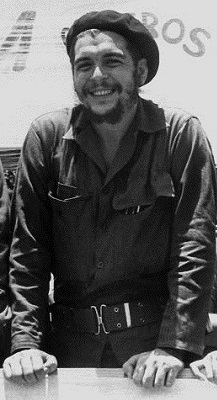|
~ Ernesto Che Guevara
~ Galéria
~ Oldal
~ Bejelentkezés
~ Vissza a Főoldalra
Ernesto Che Guevara, az argentin származású forradalmár, miniszter, gerillavezér és író, Buenos Aires-ben szerzett orvosi diplomát, majd a kubai forradalom során jelentős szerepet játszott a szigetország felszabadításában és újjáépítésében. A kubai gazdaság talpraállításáért dolgozott, küzdött az oktatás és az egészségügy fejlesztéséért, az írástudatlanság és a faji előítéletek felszámolásáért. Saját példájával népszerűsítette az önkéntes munkát. Kongóban és Bolíviában is harcolt - harminckilenc éves volt, amikor az amerikai-bolíviai csapatok csapdába ejtették és kivégezték.
| | |
|

| | |
|
|
|
1963 - 1964 Beszédek és titkos tervek
|
Mára elkészült Che Guevara életrajzának következő szakasza - ezúttal az 1964-es esztendővel ismerkedhettek meg.
Ebben az évben is történtek érdekes és jelentős események, hiszen Che merész és fontos beszédeket mondott az ENSZ közgyűlése előtt Genfben (március) és New Yorkban (december) - ez utóbbi városban nagy tüntetéseket rendeztek a Castro-ellenes csoportok és két alkalommal is megpróbálták Che-t megölni.
Olvassátok el itt: [1964]
|
|
For today I have completed the next part of Che Guevara's biography - this time you will get to know the year 1964.
In this year there were also some interesting and significant events, as Che made daring and important speeches in front of the UN assembly in Geneva (March) and in New York (December) - in the American city the anti-Castro groups made big demonstrations and some even tried to assassinate Che - twice.
Check it out here: [1964]
|
|
|
| | |
|
|
|
~ Ernesto Che Guevara
~ Gallery
~ Site
~ Log in
~ Back to the Main page
Ernesto Che Guevara, the Argentine-born revolutionary, minister, guerrilla leader and writer, received his medical degree in Buenos Aires, then played an essential part in the Cuban Revolution in liberating and rebuilding the country. He did his best to set up the Cuban economy, fought for the improvement of the education and the health system, the elimination of illiteracy and racial prejudice. He promoted voluntary work by his own example. He fought in the Congo and in Bolivia - he was thirty-nine years old, when he was trapped and executed by the joint American-Bolivian forces.
| | |
|
|

